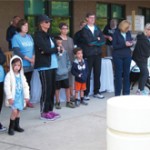“This is seed money where either someone could train someone to deliver an evidence-based program, or they could modify something in a park to make it more accessible to people with arthritis,” Dr. Callahan says. “And then we hope as an alliance—where we have many organizations as members, including the American College of Rheumatology—to use the findings from these projects to communicate more broadly about best practices that can be replicated in other communities.”
OAAA, based at the Thurston Arthritis Research Center at the University of North Carolina School of Medicine and supported by an Arthritis Foundation cooperative agreement with the Centers for Disease Control and Prevention, is already planning its next batch of mini-grants for either 2016 or 2017, depending on how quickly it can corral the needed capital.
The small-grants program, says Kirsten Ambrose, MS, OAAA program manager, “gives an exemplar that people can take to other organizations and say, ‘Hey, they were able to implement this, and look what it’s done for their employees or these people in the community.’ That’s the idea here.”
Richard Quinn is a freelance author in New Jersey.
Reference
- Osteoarthritis Action Alliance. News release: Small grants program press release. 2015 Aug 12.

